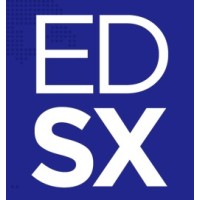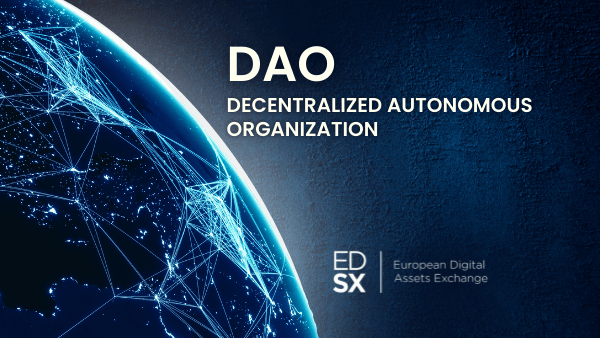Inspired by the decentralization of cryptocurrencies, a group of developers came up with the idea for a Decentralized Autonomous Organization – better known as DAO – in 2016. However, what are DAOs and how do they work in the financial market environment?
What is a DAO?
DAOs represent an effective and safe environment to work with people with akin minds around the globe. Members collectively own as well as manage DAOs as internet-native businesses.
Characteristics:
- They have built-in treasuries that no one has the authority to access without the approval of the group.
- Decisions are governed by proposals as well as voting to ensure everyone in the organization has a voice.
- There’s no CEO. Everything is transparent and the rules are established into the DAO via its code.
Why are DAOs necessary?
Overall, starting an organization with someone that involves funding and money requires a lot of trust in the people you’re working with and trusting someone met on the Internet is often controversial.
With DAOs, people who wish to connect just need to trust the DAO’s code, which is 100% transparent as well as verifiable by anyone: it’s clear that this new approach opens up many new opportunities for global collaboration and coordination.
A comparison: DAO vs A Traditional Organization
|
DAO |
A TRADITIONAL ORGANIZATION |
| Usually flat, and fully democratized. | Usually hierarchical. |
| Members must vote for any changes to be implemented. | The structure may allow a sole party to demand changes, or voting may be offered. |
| Votes tallied, and outcome implemented automatically without trusted intermediary. | Members allow voting, tally votes internally, and someone must handle the outcome of voting manually. |
| DAO members handle services offered in a decentralized manner automatically. | Requires human handling, or centrally controlled automation, prone to manipulation. |
| All activity is transparent and fully public. | Activity is typically private, and limited to the public. |
Uses of DAO: examples
If an organization is a charity: can accept membership and donations from anyone in the world and the group can decide how to spend donations.
For a freelancer network – it’s possible to create a network of contractors who pool their funds for office spaces and software subscriptions.
In case of Ventures and Grants – it’s possible to create a venture fund that pools investment capital and votes on ventures to back. Furthermore, repaid money could subsequently be redistributed among DAO members.
Types of memberships
- Token-based membership
Usually fully permissionless, depending on the token used. Governance tokens mostly allow trading without permission on a decentralized exchange. Others require earning through providing liquidity or other “proof-of-work.”
Either way, holding the token grants access to voting. It is that simple.
- Share-based membership
Share-based DAOs are more permissioned, but still quite open. Prospective members can submit proposals to join the DAO. They usually offer tribute in the form of tokens or work. Members directly vote and own shares representing proportional power and ownership. Members can, consequently, exit at any time with their share of the treasury.
Specifically, how do DAOs work?
The base are smart contracts. The contract defines the rules of the organization and holds the group’s treasury; once the contract is live on Ethereum, no one can change the rules except by a vote any action that exceedes the rules and logic in the code, fails.
The smart contract also defines the treasury. Therefore, no one can spend the money without group approval. In fact, DAOs do not require central authority because the group makes decisions collectively. As a result, payments automatically authorize when votes pass.
This is possible because smart contracts are tamper-proof once they go live on Ethereum – since everything is public, it’s impossible to change something in the code without someone noticing.
What’s the correlation of Ethereum and DAOs
Ethereum provides the ideal foundation for DAOs. Specifically, Ethereum’s consensus protocol is sufficiently distributed and established for organizations to trust the network.
Once deployed, smart contract code cannot be modified, even by its owners. Consequently, the DAO can only operate according to its original programming.
Considering these factors, it should be acknowledged that the Ethereum community has demonstrated a more collaborative rather than competitive approach. Accordingly, best practices and support systems have emerged rapidly.
What is the future of DAO?
The DAO did not return as planned in mid-2020. However, interest in decentralized autonomous organizations continues to grow as a concept.
In 2021, The Maker Foundation, longtime champions of DAOs, announced they would dissolve operations. Thus, control shifted fully to MakerDAO, the creator of DAI stablecoins.
Overall, questions remain around legal issues, security, and optimal structures for DAOs. Still, some analysts think these organizations may eventually dominate. Traditional businesses could one day give way to decentralized models.

Based in Zug, the platform is fully compliant with all Swiss laws related to financial intermediaries, banking, anti-money laundering, and organized trading facilities. Among its core values, there are innovative solutions through blockchain technology, which ensures security and liquidity.
EDSX is the first platform in Europe with primary and secondary markets for both institutional and retails. EDSX is a pioneering platform that employs the world’s leading technology to globally list security tokens in both primary and secondary markets, listing digital securities of real financial instruments to the public with a decentralized peer-to-peer exchange. Our goal is to fully engage every aspect of the financial revolution.
Do you have a question for us?
Send your query here:
[email protected]

